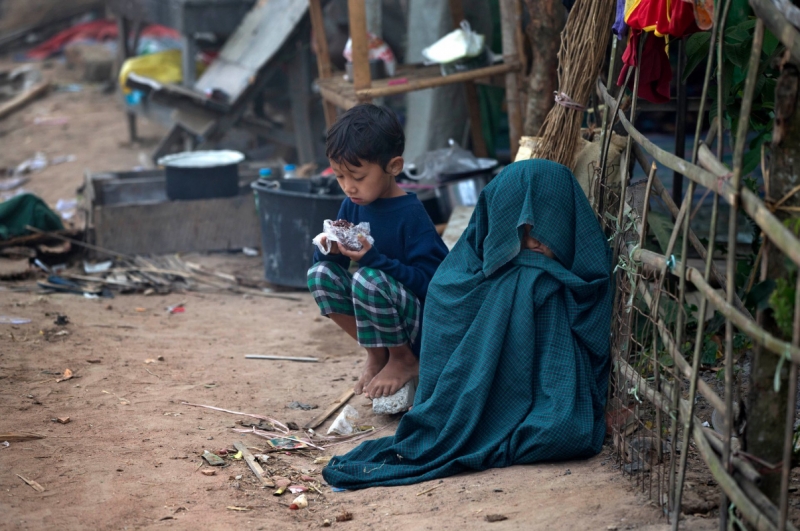




From The Guardian
The UK is among the partners in a scheme to bolster Myanmar’s fight against malnutrition, which slows the growth of nearly a third of children under five.Aung San Suu Kyi has launched Myanmar’s first national government initiative on nutrition in an attempt to tackle some of the world’s highest malnourishment rates among young children.
The country’s leader travelled to the central dry zone with five cabinet ministers to kick off the drive against a scourge that stunts the growth of nearly a third of children in Myanmar.
Suu Kyi also met international donors as she chaired the first national coordination meeting on nutrition and directed top officials to prioritise the improvement of diets among the country’s children.
Britain has targeted nutrition in its development programme in Myanmar, and the launch of the new cross-ministry strategy follows the success reduction of stunting in a pilot project partly funded by British aid money.
The Department for International Development (DfID) supplies 50% of the funding for the Livelihoods and Food Security Trust Fund (Lift), a multi-donor partnership that works on programmes to reduce poverty and hunger in Myanmar.
British officials joined other international donors on Suu Kyi’s trip to Pakokku, visiting projects where infant and maternal health has already been improved through better education and nutrition.
Myanmar is among 24 “high-burden” countries – those with the largest number of children under five years old who are chronically malnourished. Nationally, the stunting rate in under fives is 29% (pdf), one of the highest in south-east Asia. In some areas, however, half of children suffer reduced growth.
Provisional early data nonetheless indicates that stunting rates have significantly declined since the Lift nutrition project was launched across more than 200 villages badly hit by a devastating 2010 cyclone that ripped into Rakhine, the country’s poorest state.
The programme is focused on informing mothers and families about the importance of breastfeeding and immunising their infants, as well as on improving the water and sanitation infrastructure.
All pregnant women and new mothers enrolled in the programme receive $9 (£7) monthly cash payments to buy more nutritious food for their families.
Save the Children, which operates the project, has estimated that less than a quarter of infants in Myanmar are exclusively breastfed – one of the most important ways to reduce stunting.
Priti Patel, the international development secretary, has made the promotion of nutrition a priority for DfID and she discussed its impact in Myanmar in a meeting with Suu Kyi, the state counsellor, last year.
“Britain is leading the fight against child malnutrition and we are already seeing the results – rates of reduced growth among children in [Myanmar] have shown a marked improvement in regions where UK aid is in action,” she said.
“Good nutrition from an early age has a long-term and persistent impact on combating poverty, helping transform the economic potential of countries like [Myanmar], which reduces their reliance on aid in the long run.”
On her trip to Pakokku, Suu Kyi met families participating in maternal and child nutrition programmes that focus on the first 1,000 days after a child’s conception, working with pregnant and breastfeeding women, and children under two years.
Beneficiaries are supported with access to clean water and sanitation, education on nutrition and infant care, pre- and post-natal care and child vaccination services.
Pledging to remain “closely involved” in drawing up the new strategy, Suu Kyi said: “Improved nutrition is not a standalone issue. It is part of the country’s development programme.”
Myint Htwe, the health and sports minister, who will lead the initiative, added: “Health nutrition promotion is our first priority. The first strategy [on nutrition] must be prevention, not treatment.”
After the event, Claudia Antonelli, the Lift donor consortium chair and EU representative, explained the focus on the first 1,000-day window.
“The evidence clearly tells us that when children do receive good nutrition in the first 1,000 days of their lives they are 10 times less likely to die of childhood disease, will complete more grades at school and earn up to 21% more as a result as adults,” she said.
“Stunting in children, which is caused by chronic and sustained undernutrition, has long-term effects on a child’s development and economic potential. Poor nutrition is linked to 45% of child deaths.
“There is solid evidence from around the world that when governments address nutrition of women and children across sectors at a national level, that’s when results are really achieved.”
The Lift-backed projects support Buddhist, Muslim and tribal Chin Christian villages in Rakhine. But humanitarian aid access to Rohingya Muslim communities in northern districts has been severely curtailed by the recent army crackdown.
Parts of Rakhine were racked by Buddhist-Muslim violence in 2012 and more than 100,000 Rohingya now live in squalid camps for displaced people.
DfID is currently delivering humanitarian support to more than 100,000 people in the state and has been providing assistance and helping to treat acute malnutrition in camps for internally displaced people outside northern districts.
Britain, which is one of the largest bilateral aid donors to the state, has said that is ready to provide more humanitarian support to people in northern Rakhine as soon as better access is granted.